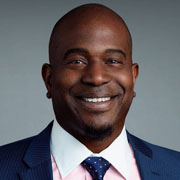 Diversity
Diversity
4.5 CE Credits - Member $90 | Nonmember $135
Target Audience: Neuropsychologists and trainees
Instructional Level: Intermediate
NAN members login and non-members create an account to:

The Diversity Collection includes the below webinars:
Disparities in Sleep Health and Impact on Brain Health
 Azizi Seixas, Ph.D.
Azizi Seixas, Ph.D.
NYU Langone Health
Department of Population Health
Department of Psychiatry
This course will cover sleep and brain health (mental health, cognitive, and neurodegenerative disease) disparities among subgroups, particularly racial/ethnic minorities. Additionally, biological, social, behavioral, and environmental factors that engender/maintain sleep and brain health disparities will be discussed. Mechanisms that explain the relationship between sleep and brain health will be discussed, particularly among racial/ethnic minorities. Lastly, the course will describe potential solutions to addressing sleep and brain health disparities.
After the session, participants will be able to:
1. Describe components of sleep health.
2. Explain how sleep health affects brain health.
3. Discuss mechanisms that explain how sleep health disparities lead to brain health disparities, particularly among racial/ethnic groups.
Health Disparities and Structural Racism: Assuring the Vital Future of Neuropsychology Through Evidence and Cultural Relevance
 Mónica Rivera Mindt, Ph.D., A.B.P.P.-CN
Mónica Rivera Mindt, Ph.D., A.B.P.P.-CN
Immediate Past-President, Hispanic Neuropsychological Society (HNS)
Professor of Psychology & Latin American Latino Studies Institute, Fordham University
Joint Appointment in Neurology, Icahn School of Medicine at Mount Sinai
In the midst of the current COVID-19 and structural racism pandemics, the urgent need to understand and address the impact of health disparities and racism on neuropsychology and those we study and serve has never been clearer. Fundamental to this effort is disentangling the sociocultural and systemic factors (e.g., anti-Black racism; other forms of racism; sexism; homo- and trans-phobia; heteronormativity; ethnocultural monoculturalism; white privilege; outdated paradigms and training models; inertia) that actively contribute to the continued lack of progress in the field. There is now a sufficient body of available demographic and epidemiologic data and scientific evidence to collectively take an evidence-based, culturally-relevant approach to all aspects of neuropsychology, including science, practice, training, and policy. As a first step, this presentation will provide an overview of current demographic trends, sociohistorical and ethical considerations, and health disparities relevant to neuropsychological research and practice; offer a review of research on the effects of sociocultural factors on the brain and neuropsychological test performance; and provide approaches for implementing evidence-based, culturally responsive neuropsychological evaluations for research and practice with diverse examinees to improve diagnostic and health outcomes.
After the session, participants will be able to:
1. Describe current demographic trends, sociohistorical and ethical considerations, and health disparities relevant to neuropsychological research and practice.
2. Summarize research on the effects of cultural/linguistic diversity on the brain and neuropsychological test performance.
3. Discuss approaches for implementing evidence-based, culturally/linguistically responsive neuropsychological evaluations with diverse examinees to improve diagnostic precision and health outcomes.
Linguistically and Culturally Appropriate Evaluations for Bilingual Children
Vindia Fernandez, Ph.D.
Evelyn Ramirez-Coombs
Alberto Miranda, Psy.D.
Bilingual Latino/a children are rapidly becoming the majority among their peers in several states, increasing from 17% of all children in the US in 2000 to 25% of the pediatric population in 2016. In densely populated states such as California, Latino children comprise more than half of the child population at 52%. Despite this increasing proportion of students, there remains a paucity of bilingual assessment tools, normative data, cohesive strategies amongst assessors, and bilingual pediatric neuropsychologists that together threaten the validity of assessments in this population (e.g., over- or under-identifying neurodevelopmental disorders). While many school districts have adopted careful guidelines regarding testing English learners in their native language, significant challenges remain with respect to determining the appropriate testing language in the school setting, as well as more broadly in the community and academic medical centers. This workshop will aim to explore these clinical decision points by examining the current literature on neurocognitive functioning in bilingual children, outlining typical bilingual language development trajectories, reviewing instrumentation for language assessment in bilingual children, and discussing limitations in the literature about language development in children with neurodevelopmental disorders. We will also present case studies to illustrate the many linguistic and cultural nuances of working with multicultural families and children, including evaluation of neuropsychological data summary sheets, provision of “mock supervision” on the conceptualization and formulation of bilingual cases, and discussion of effective treatment planning for this population. Emphasis is placed on academic-community and legal partnerships ensuring that the treatment planning is systematically implemented and monitored.
After the session, participants will be able to:
1. Describe current empirical findings regarding neurocognitive correlates of bilingualism in children.
2. Implement specific strategies for determining language dominance in bilingual children.
3. Discuss how the intersection between bilingualism and assessment strategy affects the validity of neuropsychological evaluations.
4. Evaluate the impact of culturally- and linguistically-appropriate evaluations on diagnosis and treatment planning through a case series discussion.